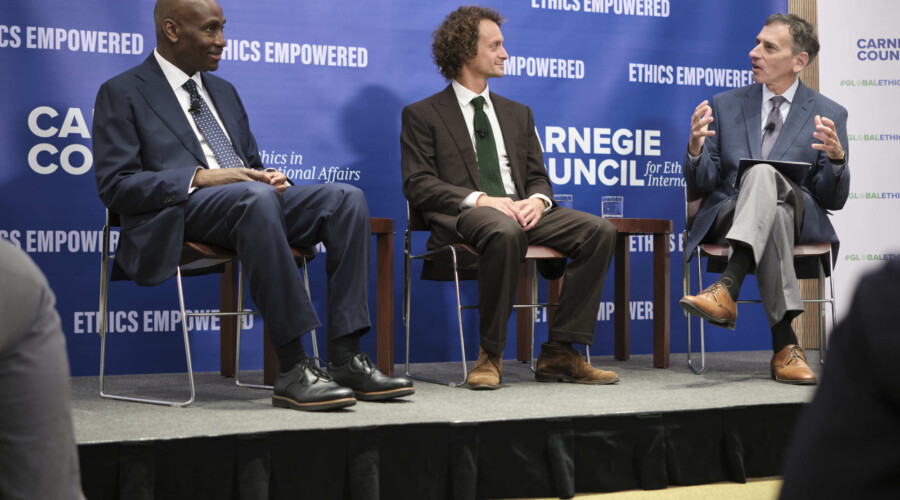How can ethics help us better understand the world in 2023 and the choices we face within it?
We must begin by acknowledging reality. Today, leaders and influencers of all kinds portray ethics as a fool’s errand and the cynic’s friend. In the words of the now bankrupt crypto-currency executive Sam Bankman-Fried, we must be “really good at talking about ethics” because it’s “a dumb game we woke Westerners play where we all say the right shibboleths, and everyone likes us.”
Bankman-Fried captures something about the spirit of our times; and perhaps we should thank him for his candor. Ethics washing and shameless corruption are real and persistent forces in public life.
But this is not the moment to cede the field to the likes of Bankman-Fried. In fact, this is the moment to elevate a counter-narrative that empowers ethics as a force for positive change.
This narrative is captured brilliantly by television comedy writer Michael Schur in his book How to Be Perfect: The Correct Answer to Every Moral Question. Carnegie Council was pleased to have Schur as our featured Global Ethics Day guest this year.
In Schur’s hands, ethics is a forgiving and life-affirming endeavor: “A big moment in my personal journey was realizing that the question that ethics is asking very broadly isn't what is good and what is bad but rather what is better and what is worse. It is all on this graded scale.
“Even the purest of philosophers, the most rigorous and intense philosophers, didn't necessarily believe that you had to be perfect or that you had to nail everything. It was simply, here's a way to make perhaps a better choice than the one you were about to make.”
OK, if we can’t be perfect, how can we do better in 2023?
First, we should clarify the virtues we are aiming to meet. In the examples below, I highlight five cases where specific virtues are currently being put to the test.
Then, as Schur says, we ought to remember that genuine “effort matters most,” i.e. a real commitment to ethical decision-making. As he puts it in the final chapter of his book, paraphrasing Samuel Beckett, the best advice is to “Try, miss, then try again aiming higher.”
Here are five recent moments that will shape ethics in international affairs in 2023
1) Martha’s Vineyard and the Policy of Cruelty
One of the most egregious examples of cynicism in 2022 was the decision of Governor Ron DeSantis of Florida to relocate 50 migrants to the small island of Martha’s Vineyard in Massachusetts. Citing his opposition to federal immigration policies and his desire to call attention to the ongoing crisis at the Southern border of the United States, DeSantis went out of his way to take advantage of vulnerable, homeless people.
Seeking to complement Texas Governor Gregg Abbott’s policy of busing immigrants without warning or coordination to Northern cities, DeSantis sponsored flights originating in San Antonio, Texas with the express purpose of creating a publicity stunt.
One need not be a student of Immanuel Kant to realize the ethical breach here: Human beings should never be treated as a “means” to an “end.” And they should never be stripped of their basic human rights and dignity as they were in this instance.
Migrants are humans–not pawns in a political game. These migrants–many of whom are fleeing violence and oppression–deserve better.
In 2023, let’s see how other political leaders in the U.S. and around the world respond to their own migrant crises. Will they recognize the humanitarian challenge? Or will they follow a policy of cruelty with humans as political pawns? The virtue of basic human decency hangs in the balance.
2) FTX and Unaccountable Oligarchs
In the wake of the FTX debacle led by Sam Bankman-Fried and the acquisition of Twitter by Elon Musk, will oligarchs retain their popular status as cultural icons and superstars? Or will a countervailing movement to confront them take hold?
The fight is on between oligarchs who seek to operate above the state, and those who seek to hold them accountable to the state and to the individuals they affect.
If there is a philosophy or ideology behind the new oligarchy, it is best expressed by Peter Thiel. Thiel’s relatively unsuccessful backing of candidates in the 2022 U.S. midterm elections is unlikely to stop him from further efforts to capture and diminish the regulatory powers of government. After all, his explicit goal is to gain and maintain monopoly status for the biggest tech firms as a substitute for government.
Thiel’s infatuation with sea-steading (creating offshore islands as a base of activity outside of state jurisdiction) is an apt image, summarizing his years of speaking and writing about his libertarian principles. When combined with his interests in crypto-currency, tech innovations, and life extension, one senses an unboundedness, high on individual rights and low on social responsibility.
Elon Musk’s foray into Twitter will be a significant test for the ideology of the unbounded oligarch. One begins to sense the potential for a popular backlash. If that backlash materializes, the virtue of accountability will be its driving force.
3) Bucha, Izium, and Normalizing Crimes of War
Among the darkest moments of 2022 are revelations of war crimes in Bucha and Izium in Ukraine. The massacre, torture, and rape of innocent civilians is an extension of months of indiscriminate attacks by Russia on Ukraine.
As I write, waves of missile strikes continue sporadically across Ukraine with the effect of terrorizing civilian populations and destroying critical infrastructure, including those providing electricity and heat. It is no secret that Russian forces seek to make the Ukrainian population suffer through the freezing cold winter months.
One can read dozens of accounts of war crimes meticulously documented by courageous journalists in the field. But the over-arching question remains: Are war crimes becoming normalized? Vladimir Putin shows no sign of abiding by any rules of war, and it remains to be seen how the world community will respond.
The European Union is now proposing a special war crimes tribunal. How each country responds to this proposal will be a true test of ethics in the coming year. The laws of war are built on the virtues of responsibility and reciprocity. Without such law inspired by these virtues, impunity and barbarism prevail.
4) Taiwan and the Gray Zone
Henry Kissinger once said that the purpose of diplomacy is to “rescue choice from necessity.” I have interpreted this to mean, when faced with a dilemma, it is useful to think creatively and to try to expand the range of choices constraining you.
This advice is being put to the test as tensions rise over the future of Taiwan. Ambiguity over U.S. commitments to Taiwan’s security has been heightened by recent events including Speaker Nancy Pelosi’s August trip to Taipei, and the CHIPS Act of 2022, which will begin to move elements of the supply chain of semi-conductors from Taiwan to the United States.
As the Biden administration pursues its strategy to bolster America’s Pacific alliances in its Indo-Pacific Strategy–including five regional treaty alliances with Australia, Japan, South Korea, the Philippines, and Thailand; ASEAN; the Quad; and AUKUS–the U.S. seems to be moving away from the unilateralism implied in the previous administration’s America First policy.
However, at the same time, China’s rhetoric and growing military capabilities continue to raise tensions in the region. Will these tensions lead to a military confrontation, and if so, how best to deter or mitigate such a possible scenario?
One can read widely about war-gaming outcomes, and it is indeed wise to understand the changing power dynamic in the region. However, as the analytics become more regularly debated, let’s remember the danger of self-fulfilling prophecy.
If a potential conflict in Taiwan is militarized at its inception, there will be little or no chance for creative thinking and action in the gray zone of diplomacy. After 9/11, U.S. foreign policy was militarized, resulting in the invasions of Afghanistan and Iraq. As the cliché had it, when you have a hammer, every problem looks like nail.
Will this militarization be repeated? Or will diplomacy have its moment? Prudence has always been the cardinal virtue of the statesman.
5) COP27: A Lesson on the Perfect and the Good
The Sharm el-Sheikh Climate Change Conference (COP 27) in November ended with mixed success. While some are disappointed in the lack of agreement on ambitious emission reduction goals to combat the near certainty of global warming overshooting the goal of 1.5 degrees (Celsius), others were pleased to see agreement on a new global pact on climate reparations.
The new agreement is a threshold moment in climate diplomacy in that it assigns responsibility to wealthy nations to compensate for “loss and damage” in poorer and developing nations. A new fund consisting of hundreds of billions of dollars will help vulnerable communities deal with impending climate changes and inevitable dislocations.
The contradictory result of the climate conference is an excellent reminder that in politics and in life, one should not let the perfect become the enemy of the good. While some progress was made at COP 27, it remains an open question as to whether this accomplishment will be a building block for COP 28 and beyond.
Accepting and building on partial success is an under-appreciated virtue. In climate diplomacy and in so many other areas of international competition and conflict, incremental progress should be a reassuring and motivating virtue to keep in mind.
The Year to Come
An essential feature of ethics is that it is a universal way of thinking. It transcends race, tribe, gender, affiliation, and identity. Perhaps this is its superpower in these days of fragmented politics–both domestic and international.
One can think of ethics and virtues as a companion–real, immediate, useful, unmysterious, and ready to be deployed as a tool to address global-scale challenges.
As 2022 gives way to 2023, there are certainly reasons for both pessimism and optimism. However, a little attention to the virtues at the heart of our shared challenges will go a long way toward pointing us in the right direction.
“I wish to be virtuous,” said Confucius, “And lo! Virtue is at hand.”




